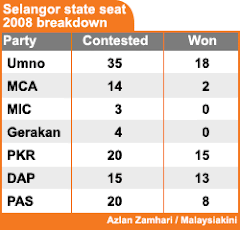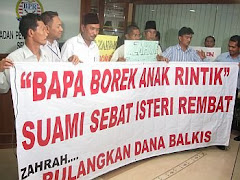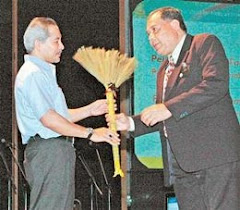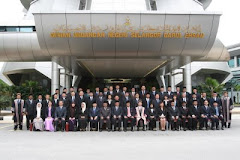May 19, 2009 By WANI MUTHIAH
SHAH ALAM: Selangor’s Select Committee on Competence, Accountability and Transparency (Selcat) has found former mentri besar Datuk Seri Dr Mohd Khir Toyo guilty of not attending its inquiry in March into the disbursement of state agency funds.
The committee, under the Selangor State Legislative Assembly, has also found him guilty of three charges of making disparaging remarks and negative statements on Selcat’s legitimacy, in the media and on his blog.
He was slapped with an earlier one-year suspension for his failure to attend the inquiry, and six months each for the three consecutive charges.
All his allowances and privileges as an assemblyman would also be suspended.
However, Selcat chairman Teng Chang Khim said these were only recommendations made by Selcat.
“These recommendations would be brought to the next State Assembly sitting in July for debate. Everybody involved, including Dr Mohd Khir, will be allowed to debate on the recommendations,” he said.
In the eight-day Selcat inquiry in March, witnesses had testified that millions of ringgit from the state’s business arm were squandered by Balkis, a charity headed by Dr Mohd Khir’s wife Datin Zaharah Kechik while he was in office.
Tuesday, May 19, 2009
Selangor to enact Freedom of Info law - Star
May 19, 2009 By SHAILA KOSHY
PETALING JAYA: Selangor will be the first state to table a Freedom of Information (FOI) Enactment bill in its legislative assembly by the end of this year.
Mentri Besar Tan Sri Khalid Ibrahim said the Pakatan Rakyat government in Selangor had decided on this because it believed that all citizens had the right to have and know as much information as they needed.
“Only a well-informed citizenry can make good decisions on matters involving public interest.
“Freedom of information and media freedom stand shoulder to shoulder.
“Without access to information, how can journalists be effective in their jobs?” Khalid said at the state government’s belated observance of World Press Freedom Day and the launch of its Communications and Media Network -- a monthly newspaper and online portal both called selangor kini, and the webTV channel TV Selangor -- at the Petaling Jaya Civic Centre Tuesday.
He said Pakatan component parties had proposed to the Federal Government that amendments be made to secrecy laws but there had been no response thus far.
“That did not mean Pakatan state governments did not have do anything; as such, we set up a Freedom of Information Taskforce last year to ensure an FOI Bill is tabled at the Legislature before the end of the year,” he said.
Khalid said the taskforce was chaired by assemblyman Elizabeth Wong and comprised assemblymen and members of the public.
Later at a press conference, he said the FOI Bill would fulfil the state government’s promise to the people to give them access to information so that the administration would be accountable for its activities.
He cited the shock of the British people to a news article revealing, as a result of a request under that nation’s FOI law, the expenses claimed for by their Members of Parliament.
To another question, he said a few assemblymen had been called up by the Malaysian Anti-Corruption Commission in relation to the Official Secrets Act (OSA) over certain documents that were discussed in the Legislature and mentioned in Parliament.
“Assemblymen have protection when they speak in the Legislature but the fact that the MACC felt the need to speak to them shows that there is a need for clarity (on the classification of secret documents),” he said.
On what would happen if the state government declared a document public under its proposed FOI enactment but the Federal Government deemed it a secret under the OSA, Khalid said that the federal law would supersede the state legislation.
“When it comes to state documents, the state has the right to contest the decision of the Federal Government,” he added.
Meanwhile, for extra check and balance, Wong said the taskforce she chairs was proposing the establishment of an independent information commission to which the public could appeal if they wanted some information and the state government refused to give it.
“The common view is that everything is under the OSA but our view is that all information should be made public, apart from some exceptions,” she added.
Asked whether the draft enactment would be made public before it was tabled, Wong said yes.
“I am trying to have it ready for the July meeting, if not then the October/ November meeting. And once it has been tabled for first and second readings, the bill will then be referred to a Select Committee.
“The Select Committee will have six months to gather feedback and hold consultations with members of the public and public bodies, and to study FOI laws in other countries, before it goes to the third reading.
“This is a common process in advanced, mature democracies and we intend to introduce it in the Selangor State Assembly,” she said.
Later, at a public consultation and forum themed “Freedom of Information: The Right to Reclaim,” Wong reminded attendees that a government holds information on the public’s behalf.
She said a government was not mandated to hide information but noted there were exceptions when it came to over-riding public interest, legal privilege, health and safety.
At the same forum, Centre for Policy Initiatives director Dr Lim Teck Ghee said the state played a major role in nurturing freedom of information.
“It has been argued by the Federal Government and its supporters that the right to speech does not mean the right to information.
“But the two go hand-in-hand because our fundamental right to speech can be effectuated only if we -- all citizens -- have the effective right to access information that is available with the government.”
Centre for Independent Journalism programme director Sevan Doraisamy said an FOI law was just as important for public servants as it was for the public.
“During the SARS (severe acute respiratory syndrome) scare (in 2005), the Health Ministry gave out good and quick information to the public but this was questioned online.
“It’s a question of trust -- an FOI law would be the first step towards building trust in the authorities,” he said.
Dipendra Harshad Rai, head of the Media Defence and Freedom of Expression Working Group in the Bar Council’s Human Rights Committee, cautioned that the proposed state enactment would not overturn the OSA but would provide a framework for how the public could get information.
He added it was important to come up with a solution to declassify information within the OSA.
Freelance journalist Padmaja Padman said the state government need not worry because an FOI law is passed to provide information based on the principles of maximum disclosure and routine publication, among others.
Transparency International-Malaysia member Ngooi Chiu-ing said greater access to information could help curb corruption
PETALING JAYA: Selangor will be the first state to table a Freedom of Information (FOI) Enactment bill in its legislative assembly by the end of this year.
Mentri Besar Tan Sri Khalid Ibrahim said the Pakatan Rakyat government in Selangor had decided on this because it believed that all citizens had the right to have and know as much information as they needed.
“Only a well-informed citizenry can make good decisions on matters involving public interest.
“Freedom of information and media freedom stand shoulder to shoulder.
“Without access to information, how can journalists be effective in their jobs?” Khalid said at the state government’s belated observance of World Press Freedom Day and the launch of its Communications and Media Network -- a monthly newspaper and online portal both called selangor kini, and the webTV channel TV Selangor -- at the Petaling Jaya Civic Centre Tuesday.
He said Pakatan component parties had proposed to the Federal Government that amendments be made to secrecy laws but there had been no response thus far.
“That did not mean Pakatan state governments did not have do anything; as such, we set up a Freedom of Information Taskforce last year to ensure an FOI Bill is tabled at the Legislature before the end of the year,” he said.
Khalid said the taskforce was chaired by assemblyman Elizabeth Wong and comprised assemblymen and members of the public.
Later at a press conference, he said the FOI Bill would fulfil the state government’s promise to the people to give them access to information so that the administration would be accountable for its activities.
He cited the shock of the British people to a news article revealing, as a result of a request under that nation’s FOI law, the expenses claimed for by their Members of Parliament.
To another question, he said a few assemblymen had been called up by the Malaysian Anti-Corruption Commission in relation to the Official Secrets Act (OSA) over certain documents that were discussed in the Legislature and mentioned in Parliament.
“Assemblymen have protection when they speak in the Legislature but the fact that the MACC felt the need to speak to them shows that there is a need for clarity (on the classification of secret documents),” he said.
On what would happen if the state government declared a document public under its proposed FOI enactment but the Federal Government deemed it a secret under the OSA, Khalid said that the federal law would supersede the state legislation.
“When it comes to state documents, the state has the right to contest the decision of the Federal Government,” he added.
Meanwhile, for extra check and balance, Wong said the taskforce she chairs was proposing the establishment of an independent information commission to which the public could appeal if they wanted some information and the state government refused to give it.
“The common view is that everything is under the OSA but our view is that all information should be made public, apart from some exceptions,” she added.
Asked whether the draft enactment would be made public before it was tabled, Wong said yes.
“I am trying to have it ready for the July meeting, if not then the October/ November meeting. And once it has been tabled for first and second readings, the bill will then be referred to a Select Committee.
“The Select Committee will have six months to gather feedback and hold consultations with members of the public and public bodies, and to study FOI laws in other countries, before it goes to the third reading.
“This is a common process in advanced, mature democracies and we intend to introduce it in the Selangor State Assembly,” she said.
Later, at a public consultation and forum themed “Freedom of Information: The Right to Reclaim,” Wong reminded attendees that a government holds information on the public’s behalf.
She said a government was not mandated to hide information but noted there were exceptions when it came to over-riding public interest, legal privilege, health and safety.
At the same forum, Centre for Policy Initiatives director Dr Lim Teck Ghee said the state played a major role in nurturing freedom of information.
“It has been argued by the Federal Government and its supporters that the right to speech does not mean the right to information.
“But the two go hand-in-hand because our fundamental right to speech can be effectuated only if we -- all citizens -- have the effective right to access information that is available with the government.”
Centre for Independent Journalism programme director Sevan Doraisamy said an FOI law was just as important for public servants as it was for the public.
“During the SARS (severe acute respiratory syndrome) scare (in 2005), the Health Ministry gave out good and quick information to the public but this was questioned online.
“It’s a question of trust -- an FOI law would be the first step towards building trust in the authorities,” he said.
Dipendra Harshad Rai, head of the Media Defence and Freedom of Expression Working Group in the Bar Council’s Human Rights Committee, cautioned that the proposed state enactment would not overturn the OSA but would provide a framework for how the public could get information.
He added it was important to come up with a solution to declassify information within the OSA.
Freelance journalist Padmaja Padman said the state government need not worry because an FOI law is passed to provide information based on the principles of maximum disclosure and routine publication, among others.
Transparency International-Malaysia member Ngooi Chiu-ing said greater access to information could help curb corruption
Subscribe to:
Posts (Atom)









